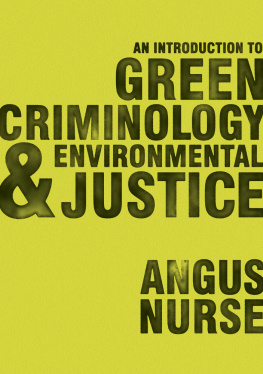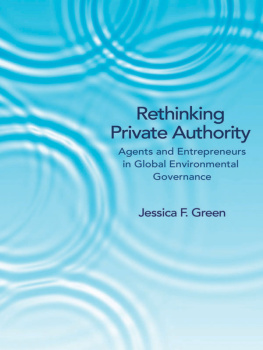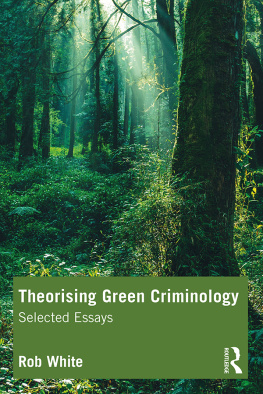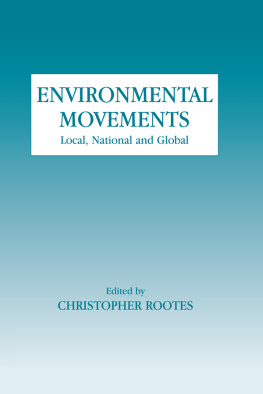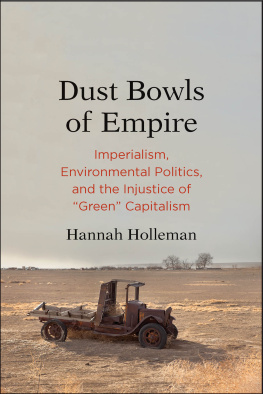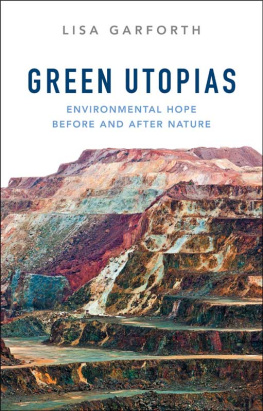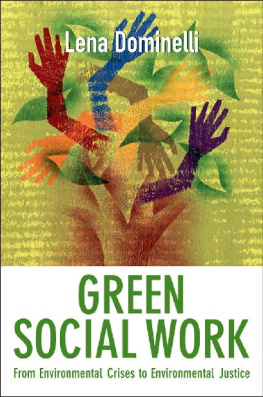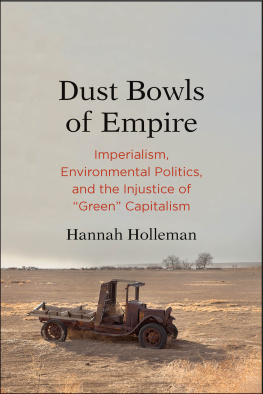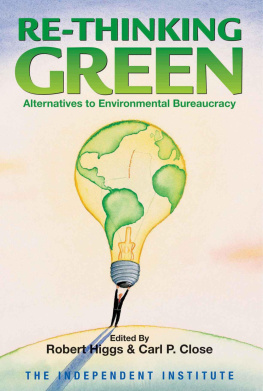Southern Green Criminology
Southern Green Criminology: A Science to End Ecological Discrimination
BY
DAVID RODRGUEZ GOYES
University of Oslo, Norway
United Kingdom North America Japan India Malaysia China
Emerald Publishing Limited
Howard House, Wagon Lane, Bingley BD16 1WA, UK
First edition 2019
Copyright David R. Goyes, 2019. Published under exclusive licence
Reprints and permissions service
Contact:
No part of this book may be reproduced, stored in a retrieval system, transmitted in any form or by any means electronic, mechanical, photocopying, recording or otherwise without either the prior written permission of the publisher or a licence permitting restricted copying issued in the UK by The Copyright Licensing Agency and in the USA by The Copyright Clearance Center. Any opinions expressed in the chapters are those of the authors. Whilst Emerald makes every effort to ensure the quality and accuracy of its content, Emerald makes no representation implied or otherwise, as to the chapters suitability and application and disclaims any warranties, express or implied, to their use.
British Library Cataloguing in Publication Data
A catalogue record for this book is available from the British Library
ISBN: 978-1-78769-230-5 (Print)
ISBN: 978-1-78769-229-9 (Online)
ISBN: 978-1-78769-231-2 (Epub)
Contents
About the Author
Preface
Acknowledgements
About the Author
David Rodrguez Goyes is a Post-doctoral Researcher at the University of Oslo, Norway. He holds a PhD in Criminology from the University of Oslo, Norway. He is a Lawyer by training, with postgraduate studies in Criminal Law and a Masters in Sociology. His main field of research is green criminology, with a focus on biopiracy. His greatest contribution to the field is in the development of a Southern green criminology.
Preface
Green criminology was officially inaugurated 29 years ago. Since then, it has largely enriched the criminological discipline by introducing new critical perspectives, theories, concepts and areas of research. In the past five years, the attention of green criminologists has been directed at the Global South as the geographical site that experiences the severest consequences of harmful environmental practices. This book presents in an ordered and reader-friendly way, an inclusive overview of the basic pillars of a Southern green criminology, providing a comprehensive theoretical, philosophical and methodological description of them. Such criminological direction is simultaneously a scientific and a political endeavour, aimed at combating the environmental harms that affect the geographical and the metaphorical Souths.
The main topic of this book is the conflicts that arise in the interaction between human beings and our natural environment, seen from a Southern perspective with a focus on the victimisation of the South. The book is divided into two parts. The first part presents the pillars of a Southern green criminology from a theoretical perspective. The six chapters in addresses key topics of interest to green criminologists: climate change, land-grabbing, biopiracy, animal exploitation and human environmental victimisation. I conclude with a proposal for how to prevent Southern green criminology from losing its relevancy and for transforming the many social dynamics that produce ecological discrimination into contributing constructively to a just future. This conclusion draws inspiration from my knowledge exchanges with members of more than 20 Colombian Indigenous communities.
This is the first book exclusively dedicated to the topic of a Southern green criminology. Its appearance is propitious, thanks, first, to the strength of the umbrella project of a Southern criminology and second, because of the pressing nature of environmental threats that are pushing the entire world to seek alternatives to prevent and curb environmental harms in every corner of the globe (Nss, 2008).
Acknowledgements
One of the memories that most often comes to mind from the time when I was conducting fieldwork in Colombia was my visit with Wayra, Wind in Quechua (a pseudonym). To visit Wayra, I took a plane from Bogot, a bus from the airport to the nearest city, a motorbike to the end of the road and from there a horse. We sat on two wooden chairs inside her humble home and began talking about seeds. With clarity and simplicity she told me about the events that led her to the situation in which she was about to lose her house and land to the bank. When I first arrived, Wayra opened a tap in the kitchen, but nothing came out. After an hour-and-a-half of conversation, water finally began to drip from the tap. It took five minutes for a cup to fill. Showing great generosity, Wayra used that water to prepare coffee for me, not without apologising for the long time it had taken.
***
I have spent hours and hours in front of my computer, reading and re-reading the transcripts of the interviews I conducted, working with the most sophisticated theories and software to analyse the material. During long walks though the Norwegian forest, I thought about how to best theorise my findings. The days were also filled with new articles to read, new books to get a hold of, another conference to attend, and more invitations to write articles and books. Little by little, I immersed myself in the world of academia. Developing concepts, highly abstract discussions, revising, editing, applying for funding, peer reviewing and much more, and the image of Wayra began to fade. Although I have thought about her often, I have not yet found the time to call her and ask if she managed to save her small farm from the hands of the bank.
***
There is much confusion in my mind. The distance and differences that exist between the academic world and the rural worlds of my research are not easy to reconcile. Academia demands a constant increase in the pace of production to gain academic credentials and climb the academic ladder. Colombian rural populations offered me what they had despite struggling to find the minimum means to survive (food, water, health services and hopefully electricity). The comfort found in academia seems immense when compared to the hardships endured by rural communities in Colombia the daily problems faced in academia seem minute in relation to those experienced by Indigenous communities. My confusion arose because I was able to enjoy the comforts offered by the academic world thanks to the generosity of the Colombian rural populations, while they were still immersed in serious problems. Nonetheless, the passion that was awakened that 17th day of December in 2012 when, for the first time, I heard several peasants talk about the problems they were experiencing because of the way nature was being monopolised, was still there. But that passion is not the only thing that remains: the challenge to determine how best to use my academic credentials and the resources of the academy to contribute positively to the situation of the marginalised groups I worked with is also present. I am keenly aware of the peril of publishing for the sake of publishing, of falling into an industrial machine that seeks to obtain economic profit from knowledge instead of producing knowledge to prevent harms. As part of the project of contributing to the structural transformation of the harmful contexts of many in impoverished locations through green criminology research, this book aims to inspire further scientific research that not only exposes ecological discrimination for what it is, but that also actively opposes and curbs its reach.


